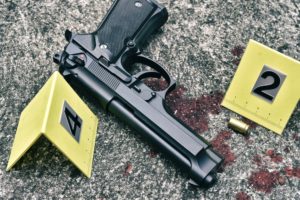
Federal laws prohibit many activities related to firearms. In some cases, you can even be charged with a crime just because you have a gun in your possession. Gun laws also make the penalties for other crimes much harsher if a firearm is involved, such as a prison sentence. You need to talk to a Los Angeles federal crimes lawyer.
At the Simmrin Law Group, we work hard to protect your rights and keep you from being fined or sent to prison. We have a team of top federal gun offense lawyers in Los Angeles who have dedicated their careers to helping people fight gun charges and other federal crimes. Fill out the form to the right or call us for your free consultation with our experienced Los Angeles criminal defense lawyer.
When Is Possessing a Gun a Federal Crime?
Federal Law 18 USC §922 makes it illegal for certain people to possess or receive firearms or ammunition. The law applies to:
- People convicted of a felony
- People convicted of domestic assault, even if the charge was a misdemeanor
- Drug users or addicts
- Illegal aliens and aliens who have been lawfully admitted to the U.S. but do not have a green card
- Fugitives
- People subject to a domestic restraining order
- People dishonorably discharged from the military
For a federal crime to be committed, the firearm also has to have been transported across state lines at some time. If not, it should be handled by California state law and local authorities.
For a free legal consultation with a federal gun offense lawyer serving Los Angeles, call (310) 896-2723
Federal Penalties for Possession of a Firearm
When you illegally possess a firearm that was transported across state lines, you could face significant prison time. For a first offense, you could face up to 10 years in federal prison. If you have three or more prior convictions for violent crimes or drug trafficking, your sentence can be increased.
You can also face a 10-year sentence if you knowingly gave or sold a firearm to someone for whom gun ownership is restricted. In addition to prison time, this offense can result in up to three years of probation, as well as being fined up to $250,000.
Los Angeles Federal Gun Offense Lawyer Near Me (310) 896-2723
What if a Firearm Is Used in a Violent Crime or Drug Offense?
Under Federal Law 18 USC §924, it is illegal to use or possess a firearm in relation to or in furtherance of a drug felony or federal “crime of violence.” This means that if you are charged with a drug offense or violent federal crime, you will face harsher penalties if you also had a gun.
In these situations, it does not matter whether you fired the gun or even displayed it. The prosecution only needs to prove that you had a firearm to use as part of the crime.
What is a “Crime of Violence”?
A “crime of violence,” under federal law, is any federal felony that either involves using physical force or a threat of force against someone else or involves a substantial risk that force may be used in committing the offense.
The penalty for this offense ranges from a minimum sentence of five years in federal prison to a maximum of life in prison without parole. If anyone died because of your firearm offense, you could even face the death penalty for this offense. Even if no one was hurt, actually using a gun will bring a stiffer sentence than just possessing one during the crime.
Click to contact our Los Angeles Federal Crimes Lawyers today
Other Crimes that Can Be Charged as Federal Gun Offenses
A variety of other federal laws govern gun possession and use. Some of the firearms activities prohibited by federal statutes include:
- Possessing, concealing, selling, shipping, or transporting across state lines a stolen gun, ammunition, or explosive, or stealing a firearm from a firearms licensee. This offense is punishable by up to 10 years in federal prison.
- Possessing or discharging a firearm in a school zone. This crime carries a maximum sentence of five years in prison.
- Knowingly possessing or manufacturing a variety of firearms, including machine guns, firearm silencers, sawed-off shotguns or rifles, destructive devices, and guns with a missing or altered serial number. This offense is punishable by as much as five to 10 years in prison.
- Selling, transferring, or delivering a firearm to a minor under age 18, or in some cases, 21. Penalties vary depending on whether the seller was a firearms licensee and whether there was reason to believe the minor would commit gun violence.
Complete a Free Case Evaluation form now
What Counts as a Firearm Under Federal Law?
Under federal law, guns are not the only type of firearms. Firearms can also include a firearm muffler or silencer or destructive devices such as a bomb, grenade, Molotov cocktail, incendiary device, or poison gas. A firearm can also be a collection of parts that could readily be used to assemble a destructive device.
BB guns, pellet guns, and paintball guns, on the other hand, do not count as firearms under federal law. That is because these devices use compressed air rather than explosives to expel their projectiles.
What Are Some Defenses Against Federal Firearms Charges?
An experienced Los Angeles federal crimes lawyer will raise a number of defenses. The strategy for your case will depend on the specific gun offense with which you are charged. Common arguments against gun charges include:
- Lack of evidence
- Illegal search and seizure
- Duress or threat
Lack of Evidence
The prosecution must prove its case beyond a reasonable doubt for a judge or jury to return a guilty verdict. If the government does not have enough evidence to prove the required elements of its case, you should not be convicted.
Illegal Search and Seizure
Firearms are often discovered through search and seizure. However, if the police did not follow proper procedure, the evidence gathered in the search can be suppressed, leading to an acquittal.
The Fourth Amendment protects citizens against illegal search and seizure. Authorities must obtain a search warrant or have probable cause to legally search your person or property.
After evidence is legally obtained, it must still be processed correctly. A break in the chain of custody can invalidate the gathered evidence.
Duress or Threat
Occasionally a defendant can escape liability by showing that they needed to have a gun to guard against an imminent threat of death or serious bodily injury. They must also show that there was no reasonable alternative but to have a gun.
This list is far from exhaustive. Depending upon your situation, your lawyer may raise several other options for a viable defense. Building a successful defense to a federal gun charge takes an in-depth knowledge of federal laws and procedures. The sooner you have an experienced Los Angeles federal criminal lawyer working on your case, the better your chances of beating a gun charge.
Why You Need a Lawyer with Federal Experience
Cases prosecuted at the federal level follow a different process from state-level cases. On top of that, the resources available to federal prosecutors are often much greater, and the attorneys handling these cases for the government tend to be among the best prosecutors in the country.
In order to win your case, it is critical that you have someone with experience at the federal level who can correctly navigate the procedures of the court. You will want an attorney with a proven track record of taking on top-tier prosecutors and getting favorable results. Our federal gun offense lawyers in Los Angeles have the necessary experience to fight your case at the federal level.
Talk to a Los Angeles Federal Gun Offense Lawyer for Free Today
At the Simmrin Law Group, our goal is to give you the strongest possible legal defense to federal gun charges and other federal crimes. We level the playing field between you and the federal government, pursuing every possible avenue to win your case.
Give us a call or fill out our online contact form to schedule a free, no-obligation case evaluation today. One of our federal gun offense lawyers in Los Angeles will review your case and advise you of all your legal options.
Call or text (310) 896-2723 or complete a Free Case Evaluation form

